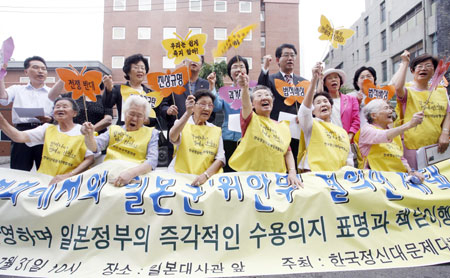US House seeks Japan apology on WWII sex slaves
(AP)Updated: 2007-07-31 08:40
Monday's nonbinding resolution is symbolic, but it has caused unease in Japan and added tension to an otherwise strong alliance. Officials in Tokyo say their country's leaders, including current Prime Minister Shinzo Abe, have apologized repeatedly because the Imperial Japanese Army forced women to work in military brothels in the 1930s and 1940s.
The resolution's supporters, however, say Japan never has assumed responsibility for the treatment of the women.
Democratic Rep. Tom Lantos called "nauseating" what he said were efforts by some in Japan "to distort and deny history and play a game of blame the victim."
"Inhumane deeds should be fully acknowledged," said Lantos, chairman of the House Foreign Affairs Committee. "The world awaits a full reckoning of history from the Japanese government."
The House resolution, which has no companion in the Senate, urges Japan to "formally acknowledge, apologize and accept historical responsibility in a clear and unequivocal manner" for the suffering of so-called "comfort women."
Lawmakers want an apology similar to the one the US government gave to Japanese-Americans forced into internment camps during World War II. That apology was approved by Congress and signed into law by President Ronald Reagan in 1988.
The House resolution adds to recent woes for Abe, whose political party suffered a humiliating defeat in parliamentary elections during the weekend. He has refused to quit, despite demands that he resign. A congressional staffer, speaking on condition of anonymity because the person was not authorized to be quoted, said the Japanese Embassy in Washington requested that the House vote be held after Japan's elections so as not to influence the outcome.
Historians say hundreds of thousands of women, mainly from Korea, China and the Philippines, were sent to wartime Japanese military brothels.
Democratic Rep. Mike Honda, the resolution's chief sponsor, said Lee Yong-soo, who testified before Congress in February of her rape and torture at the hands of Japanese soldiers, watched Monday's proceedings. "All she could do was weep and say thank you," said Honda, a Japanese-American who spent time as a child in an internment camp. "It vindicated her past."
Many Japanese right-wing politicians claim, however, that the issue has been exaggerated; they say the term "sex slaves" should not be used to describe the women because they were generally paid.
Earlier this month, a group of Japanese lawmakers and conservatives demanded the US Congress retract the resolution; they said it "is based on wrong information that is totally different from the historical fact."
Abe caused anger throughout Asia, and among even supporters in Washington, in March when he said there was no evidence that the women had been coerced into working as prostitutes.
After decades of denial, the Japanese government acknowledged its role in wartime prostitution after a historian discovered documents showing government involvement. In 1993, the government issued a carefully worded official apology, but it was never approved by parliament. Japan has rejected most compensation claims, saying they were settled by postwar treaties.
Japan's reaction
Chief Cabinet Spokesman Yasuhisa Shiozaki told a news conference the
following morning in Tokyo that Japan has already offered an extensive
explanation to Washington, adding, "It is regrettable that this resolution was
adopted."
Shiozaki said Prime Minister Shinzo Abe has "clearly explained
his views" on this mater to the U.S. side during his trip to Washington in
April. "The government has handled the comfort women issue with sincerity," he
said.
Historians say the Imperial Japanese Army forcibly sent hundreds
of thousands of women, mainly from Korea, China and the Philippines, to wartime
Japanese military brothels to work as prostitutes in the 1930s and 1940s.
Since the government's acknowledgment in early 1990s, Japanese leaders,
including Abe, have repeatedly apologized over the problem.
Shiozaki
said Japan has no plans to lodge a protest with Washington over the resolution.
"We have already worked to clearly explain Japan's view," he said. "We
will continue to do so."
But Japanese right-wing politicians claim
that the issue has been fabricated or exaggerated. A group of lawmakers and
conservatives earlier this month demanded the U.S. Congress retract the
resolution.
Abe has triggered anger across Asia in March by saying there
was no proof the women were coerced.
Though symbolic, the nonbinding
resolution has caused unease in Japan and its relations with Washington. It is
believed to add recent woes for Abe, whose ruling party faced a humiliating
defeat in Sunday's parliamentary elections.
In 1993, Japan's government
issued a carefully worded official apology but has rejected most compensation
claims, saying they were settled by postwar treaties.
The Asian Women's
Fund, created in 1995 by the Japanese government but run independently and
financed by private donations, has provided a way for Japan to compensate former
sex slaves without offering official government compensation. Many comfort women
have rejected the money.
|
|
|
||
|
||
|
|

